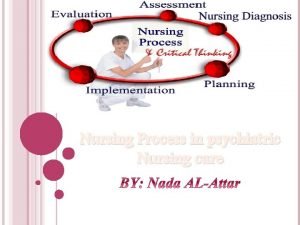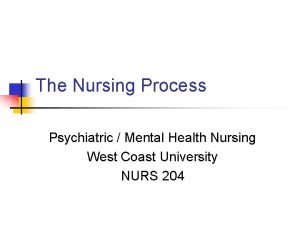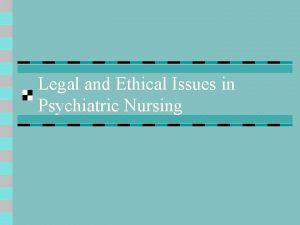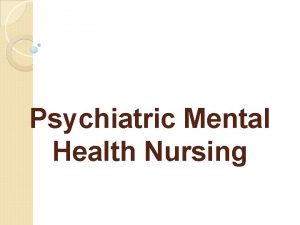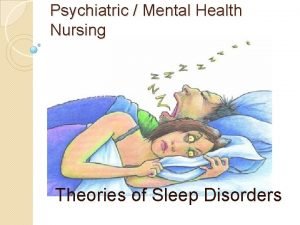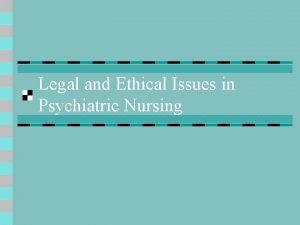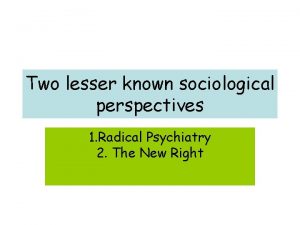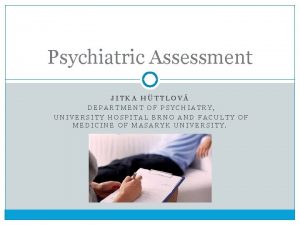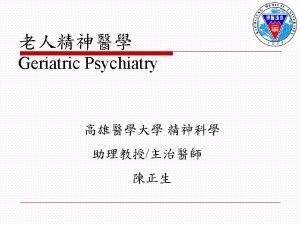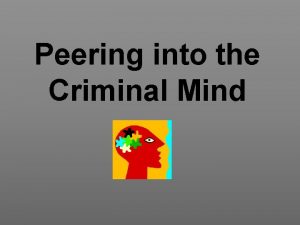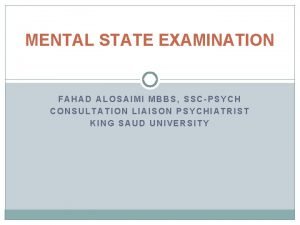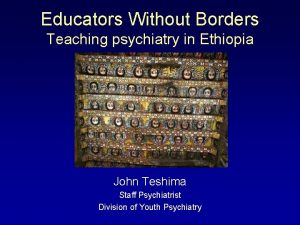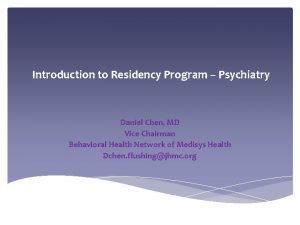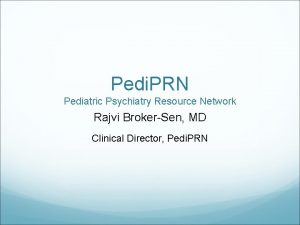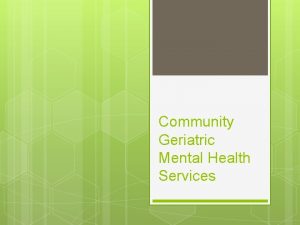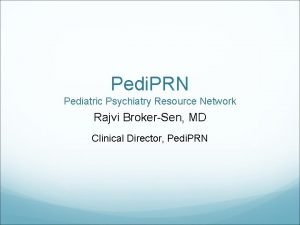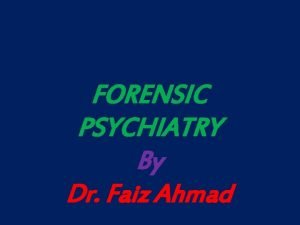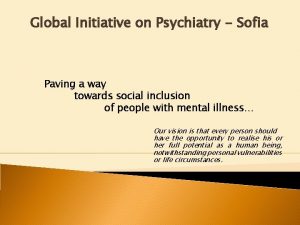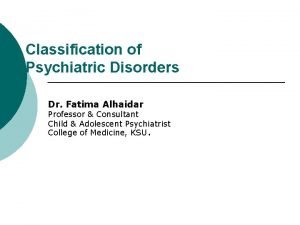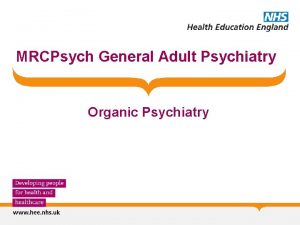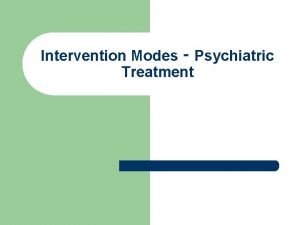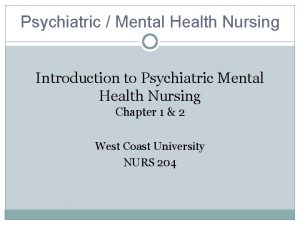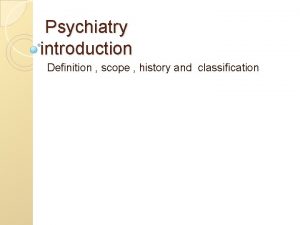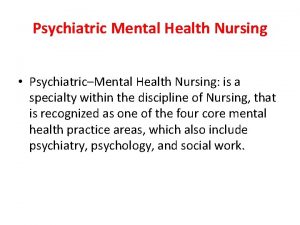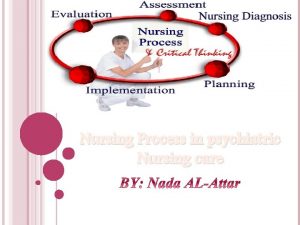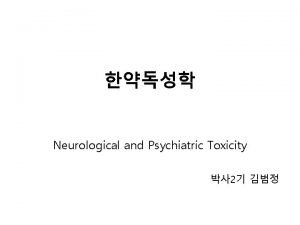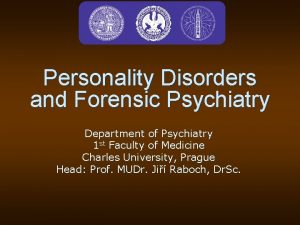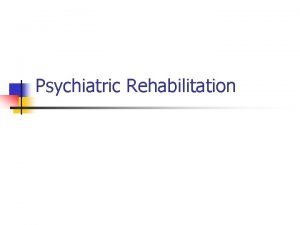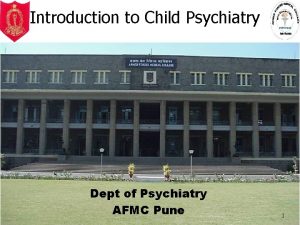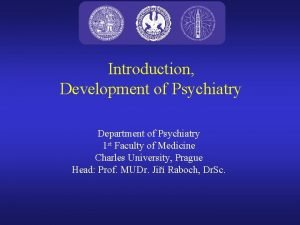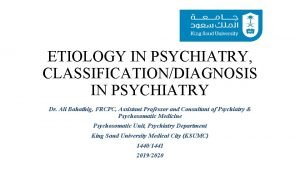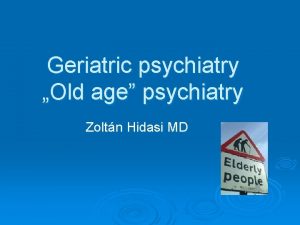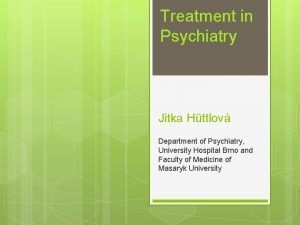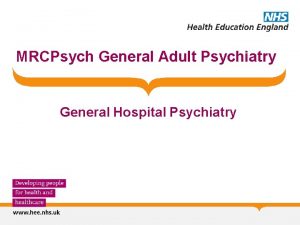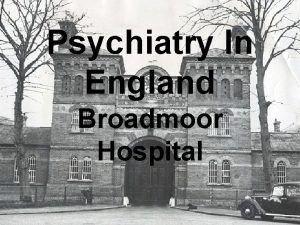History of Psychiatry and Psychiatric Nursing Sr Poojitha

























- Slides: 25


History of Psychiatry and Psychiatric Nursing Sr. Poojitha MSJ

Psychiatry • It is a branch of medicine that deals with the diagnosis, treatment and prevention mental illness.

Psychiatric Nursing • It is a specialized area of nursing practice employing theories of human behavior, as a science and the purposeful use of self as an art in the diagnosis and response to actual or potential mental health problems (American Nurses Association 1994)

• Psychiatric nursing deals with the promotion of mental health, prevention of mental illness, care and rehabilitation of mentally ill individuals both in hospital and community.

History of Psychiatry Primitive beliefs regarding mental illness: • Individual had been dispossessed of his/her soul Mgt: Returning the soul to the client • Broken a taboo or sinned against another individual or god Mgt: Ritualistic purification

Evil spirits or super natural/magical powers entered the body Mgt: • Exorcism (prayer, noise making) • Brutal beating, starvation, Burning, amputated and tortured • Oral preparation of a purgative made from sheep dung and wine • Trephining (A circular opening made on the skull by means of crude stone instruments to let out evil spirits)

Development of Psychiatry • Pythagoras (580 -510 BC) : developed the concept that the brain is the seat of intellectual activity • Hippocrates (460 -370 BC) : described mental illness as hysteria, mania and depression • Plato (427 -370 BC) identified the relationship between mind and body. • Asciepiades, who is referred to as the father of psychiatry, made use of simple hygienic measures, diet bath, massage in place of mechanical restraints.

• Aristotle, a Greek philosopher, emphasized on the release of repressed emotions for the effective treatment of mental illness. He suggested catharsis and music therapy for the patient with melancholia • St. Augustine who believed that although God acted directly in human affairs, people were responsible for their own actions

• Renaissance in Europe( 1300 - 1600 AD): it was believed that demons were the cause of hallucinations, delusions and sexual activity Mgt: Torture and even death

Important Milestones 1773: The first mental hospital in the US was built in Williamsburg, Virginia 1793: Philip Pinel removed the chains from mentally ill patients confined in Bicetre, a hospital outside Paris i. e. the first revolution in psychiatry 1812: The first American text book in psychiatry was written by Benjamin Rush, who is referred

1812: Clifford Beers, an ex- patient of mental hospital wrote the book, “The Mind That found Itself” based on his bitter experiences in the hospital 1912: Eugene Bleuler, a Swiss psychiatrist coined the term Schizophrenia The Indian Lunacy Act passed 1927: Insulin shock treatment was introduced for schizophrenia 1936: frontal lobotomy was advocated for the management of psychiatric disorders

• 1938: Electro Convulsive Therapy (ECT) was used for the treatment of psychoses • 1939: development of psychoanalytical theory by Sigmund Freud led to new concepts in the treatment of mental illness. • 1946: The Bhore committee presented the situation with regard to mental health services. Based on the recommendations 5 hospitals were set up at Amirtsar, Hyderabad, Srinagar, Jamnagar and New Delhi

• 1949: Lithium was first used for the treatment of mania • 1952: Chlorpromazine was introduced which brought about a revolution in psychopharmacology • 1963: The community Mental Health centres Act was passed • 1978: The Alma –Ata declaration of ‘Health for all by 2000 AD’ posed a major challenge to Indian mental health professionals.

• 1981: Community psychiatric centres were setup experiment with primary mental health approach at Raipur Rani, Chandigarh and Sakalwara, Bangalore. • 1982: The Central Council of India accepted the national Mental Health Policy and brought out the National Mental Health programme in India. • 1987: The Indian Mental Health Act was passed

• 1990: The Govt. of India formed an Action Group at Delhi to pool the opinions of mental health experts about the National Mental health program • NIMHANS Bangalore has taken up the leadership in orienting heath care professionals about the mental health programs of our country

Development of Modern Psychiatric Nursing • 1872: First training school for nurses based on the Nightingale system was established by the New England Hospital for women and children, USA • Linda Richards the first Nurse to graduate from the one year course, • developed 12 training schools in the USA

• 1882: first school to prepare nurses to care for the mentally ill was opened at Mc Lean Hospital in Waverly • Two year program was started but few psychological skills were addressed and much importance was given to custodial care such as personal hygiene, nutrition, medication etc • 1913: John Hopkins became the first school of nursing to include a fully developed course for psy. nsg in the curriculum

• 1943: Psy. Nsg course was started for male nurses • 1946: Health survey committee’s report recommended preparation of nursing personnel in Psy. Nsg also. The existing institutions like mental hospitals in Bangalore and Ranchi should start training

• 1952: Dr. Hildegard Peplau defined therapeutic roles that nurses might play in the mental health setting. • She described the skills and roles of the psy. Nurse in her book “interpersonal relations in Nursing”. It was the first systematic and theoretical frame work developed for Psy. Nsg.

• 1953: Maxwell Jones introduced therapeutic community. • 1956: one year post certificate course in psy. nsg was started at NIMHANS, Bangalore • 1960: The focus began to shift to primary prevention and implementing care and consultation in the community • The name psychiatric nursing changed in to mental health nursing. 1970’s when it was known as psychosocial nursing.

• 1963: Journal of Psy. Nsg and Mental Health services was published. • 1964: Mudaliar committee felt the need for preparing large number of Psy. Nurses and recommended inclusion of Psychiatry in the nursing curriculum. • 1965: The Indian Nursing Council included psy. Nsg as a compulsory course in B. Sc Nsg program • 1973: Standards of psychiatric and mental health nursing practice were enunciated to provide a means of improving the quality care

• 1975: Psy. Nsg was offered as an elective subject in M. Sc Nursing at the RAK College of Nsg, New Delhi • 1980: Scientific advances in the area of psychobiology, brain imaging techniques, knowledge about neurotransmitters and neuronal receptors , molecular genetics related psychiatry etc. emerged. • These contributed to the shift from psychodynamic models to more balanced psychobiological models of psychiatric care.

• 1986: The Indian Nursing Council made psy. nsg a component of General nursing and Midwifery course • 1990: During these years integration of neuro sciences into holistic biopsychosocial practice of psychiatric nursing occurred • 1994: The above mentioned changes led to the revision of standards of psychiatric and mental health nsg

 Ineffective childbearing process example
Ineffective childbearing process example Nursing process in psychiatric nursing
Nursing process in psychiatric nursing Development of modern psychiatric nursing
Development of modern psychiatric nursing Ethical and legal issues in psychiatric nursing
Ethical and legal issues in psychiatric nursing Mental health nursing definition
Mental health nursing definition Sleep disorders
Sleep disorders Defense mechanisms nursing
Defense mechanisms nursing Radical psychiatry sociology
Radical psychiatry sociology Assessment skills
Assessment skills Geriatric psychiatry definition
Geriatric psychiatry definition Forensic psychiatry vs forensic psychology
Forensic psychiatry vs forensic psychology Mse psychiatry
Mse psychiatry Nbme shelf percentiles 2020
Nbme shelf percentiles 2020 European psychiatry
European psychiatry Psychiatry in ethiopia
Psychiatry in ethiopia Jamaica hospital psychiatry
Jamaica hospital psychiatry Criminal psychology terms
Criminal psychology terms Addiction expert witnesses
Addiction expert witnesses National network of child psychiatry access programs
National network of child psychiatry access programs Community geriatric psychiatry
Community geriatric psychiatry Core psychiatry
Core psychiatry National network of child psychiatry access programs
National network of child psychiatry access programs Asclepiades father of psychiatry
Asclepiades father of psychiatry What is the difference between neurosis and psychosis
What is the difference between neurosis and psychosis Gipsofia
Gipsofia Neurosis vs psychosis
Neurosis vs psychosis
